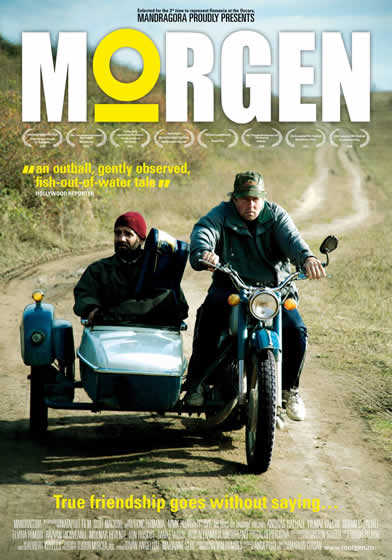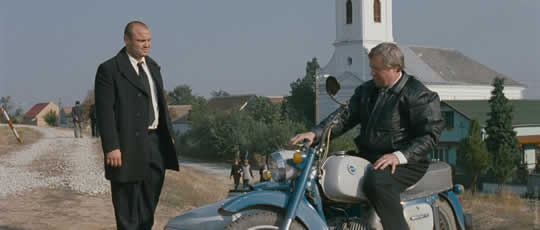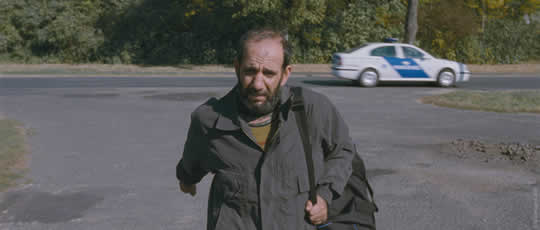MORGEN is the story of NELU, a man in his forties who works as a security guard in the local supermarket in Salonta, a small town on the Romanian-Hungarian border, where many illegal emigrants try to cross first to Hungary and then to Western Europe. One morning, NELU will “fish” something different out of the river: a Turkish man trying to cross the border. Not able to communicate verbally, the two men will somehow understand each other.
NELU takes the stranger to the farmhouse, gives him some dry clothes, food and shelter, but doesn’t really know how to help him. When the Turkish man gives NELU all the money he has to help him cross the border, NELU promises tomorrow, ‘MORGEN’…
MORGEN is the first feature film from Marian Crisan who previously won the Palm D’Or at Cannes for his short film “Megatron” (2008), which was presented in more than 60 International Film Festivals. MORGEN was produced by Mandragora, founded by Cristi Puiu and Anca Puiu in 2004. Mandragora quickly became a success with its first production, “The Death of Mr. Lazarescu,” considered the first major film in the so-called “Romanian New Wave” and the spark that ignited a national film renaissance that continues to this day.
Bijan Tehrani: How did you come up with the idea of Morgen?
Marian Crisan: The fact is that I wanted to make a film about my hometown Salonta and about the people living there. I had lived there for 20 years. The idea was to depict the people and the places there that I knew like the palm of my hand. For me, places are very important in film.
I started the script after reading a small newspaper article in the local paper in the winter of 2008. It was just after Christmas and I was in my home town Salonta. I was warm and comfortable and I was reading this piece of news about two Kurdish emigrants caught by the Border Police in a freezing river canal just near my hometown… I felt for those men. I imagined them there in the fields and in the river desperately trying to cross the border while I was inside together with my family.
I started to imagine the journey of an emigrant who stops in Salonta for a while and I tried to research and then imagine an encounter between a local guy from Salonta and a man on his way to the West. It intrigued me. What would happen to a regular guy from Salonta when he meets a real stranger?
It developed really quickly I may say, because I started to imagine the story from the point of view of the local guy meeting the emigrant. It was my choice to try and tell the story from the point of view of the people that the emigrant meets on his way. I think its fair to talk about certain things from a point of view that you understand. I knew a lot about the mentality and habits of the people living in the farmhouses on the border zone and less about emigrants.
The truth is that Romania is a country that exports emigrants. That took place a lot in the nineties up until 2007 when we entered the European Union. I think Romanians and people coming from the east have a kind of solidarity regarding many issues, including emigration.
BT: How challenging was making the Morgen?
MC: Shooting the film was challenging in the sense that we wanted to observe and put on screen a specific place and specific people. We wanted to be true to that. It is not easy because cinema demands editing and fiction, and we did not want to edit the story too much but to make it feel organic and real, not made up as in the usual way of storytelling.
BT: Please tell us about your casting process for Morgen
MC: Casting was done in theaters in West Romania. Many actors were on screen for the very first time and it was my first film, so we all tried to find the characters in the casting and while shooting. I like to think that the whole process of filmmaking is a kind of quest, an adventure.
 We cast two incredible actors for the main parts: Andras Hathazi plays the Romanian guy and Ylmaz Yalcin plays the Kurdish guy. Ylmaz came all the way from Istanbul to Romania to play the part. It was great meeting with this wonderful and energetic actor.
We cast two incredible actors for the main parts: Andras Hathazi plays the Romanian guy and Ylmaz Yalcin plays the Kurdish guy. Ylmaz came all the way from Istanbul to Romania to play the part. It was great meeting with this wonderful and energetic actor.
Also we cast many amateur actors in the vein of Neorealist Films which for me are a great inspiration in terms of style and technique.
BT: Did you do a lot of rehearsals or you just worked with actors on the set?
MC: Actually we worked a lot with the actors in the casting process. It was a long process of choosing the right actors. We worked with them again on set. I like to let the actors feel free on set and to have the feeling we are not actually making a film, but having fun and playing the scenes. And shooting should come naturally, not imposed by anybody.
BT: Did you allow any improvisations proposed by your cast or crew?
MC: We work with improvisation a lot. In a cinema verite kind of style, things are made up in rehearsal, in the script rewrite or on set. Actors should feel free on the set. There is a limit to improvisations regarding text, but written text is far from being spoken text. Somehow the film doesn’t exist until is edited.
BT: How did you come up with the visual style of the Morgen?
MC: For every film I make I try to find a special approach. I meditate on the characters and story and try to ask myself how this particular story should be shot. I don’t believe that films should look the same. They should be personal and with an edge even if they are genre films. We can only try to make them special, so to say. 
BT: How much of film was found its final form in the editing process?
MC: Actually we had many versions when editing, but in the end we got almost the exact version of the first draft of the script. The end of the film was different in the script and when shooting, but when we cut the film we found that we could make it more powerful by editing some more scenes.
BT: Please tell us about the critics and audience responses to the film.
MC: It’s hard to talk about that as a director, but as my friends around me tell me, there were good reviews and everything. I try not to follow that too much because it tends to influence you and to bother you. I stayed in the screening room many times in the past year and it’s a real joy when you see the audience react to the film. And what is funny is that the reactions to the film are fairly similar everywhere in the world.
BT: Any future project that you can tell us about?
MC: We are preparing to shoot my second feature this year. It is called IGUANAS and the action takes place in the same part of Romania. This time, however, in a bigger city and with quite a different kind of story.
Website: http://www.morgen.ro/

